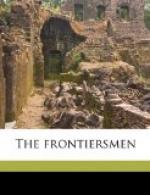Whether the extraordinary vitality and vigor of the young warrior were reasserted after life had been pronounced wholly extinct, and thus his relations were induced to defer the obsequies, or that he was enabled to exert supernatural powers and in the spirit reappear in his former semblance of flesh,—both theories being freely advanced,—certain it is that after a time he returned to his old haunts as gay, as reckless, as impetuous as ever. He bore no token of his strange experience save sundry healed-over scars of deep gashes in his breast, which he seemed at times to seek to shield from observation; and this he might have accomplished but for his solicitude that a very smart shirt, much embroidered and bedizened with roanoke, should not suffer by exposure to water; wherefore he took it off when it rained, and in swimming, and on the war-path. He manifested, too, a less puerile anxiety to escape the notice of Atta-Kulla-Kulla and other head men, who were supposed to be well affected at that time to the British government. This he was the better enabled to do as his habitat, Kanootare, was the most remote of the Cherokee towns, his name, Attusah, signifying the “Northward Warrior.”
After the capitulation of Fort Loudon and the massacre of the garrison the previous year, and the organized resistance the Cherokees had made in the field of battle against Colonel Montgomerie, then commanding the expeditionary forces, he had felt that the tribe’s openly inimical relations with the British government warranted him in coming boldly forth from his retirement and competing for the honors of the present campaign of 1761. His friends sought to dissuade him. The government had had, as assurance of his death, the word of Atta-Kulla-Kulla, who might yet insist that the pledge be made good. That chief, they urged, had a delicate conscience, which is often an engine of disastrous efficiency when exerted on the affairs of other people. Attusah was advised that he had best stay dead. Although he finally agreed with this, he could not stay still, and thus as he appeared in various skirmishes it became gradually bruited abroad among the Cherokees that Attusah, the Northward Warrior, was a great ada-wehi, a being of magical power, or a ghost as it might be said, of special spectral distinctions. Thus he lived as gayly yet as before the dismal day of his execution, always carefully, however, avoiding the notice of Atta-Kulla-Kulla, whose word had been solemnly accepted by the British government as the pledge of his death.
It is impossible to understand how a man like Digatiski of Eupharsee could believe this,—so sage, despite his ignorance, so crafty, so diplomatic and acute in subterfuge, yet he was sodden in superstition.




